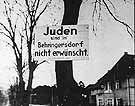
|
|
|

|

|

|

|
|
Click on an image to see a larger, more detailed picture.
|
|
|
|
|
| 1935: Steps Toward Destruction |

|
pg. 85 |

|
|
|
|
| |
|
|
|
|
|
|
| |
After
the Nazis took power in 1933, Germany's loosely affiliated Jewish communities established a new national organization. It was called the Reichsvertretung der Deutschen Juden (Reich Representation of German Jews). Led by Rabbi Leo Baeck and Otto Hirsch, the Reichsvertretung faced a thicket of problems: Jewish educational needs, vocational training, welfare, emigration assistance, and much more. Still, Baeck, Hirsch, and others worked gallantly to help their people. They even remained hopeful for a truce with the Nazi Party--a hope that, in retrospect, was sadly naive. In 1935 government authorities required the Reichsvertretung to change its name to Reichsvertretung der Juden in Deutschland (National Representation of Jews in Germany), a nuance that exemplified the Nazi intention to cut off the Jews' German identity. Nevertheless, the Reichsvertretung --like most individual Jews in Germany--did not fully perceive the Nazis' uncompromisingly anti-Jewish position. Jews just could not believe that the persecution would escalate. On September 24, 1935, the Reichsvertretung published an article in the newspaper Jüdische Rundschau (Jewish Review). Written for Jews and Germans alike, it spoke about the ways in which "a tolerable relationship" could be established "between the German and the Jewish people." The Reichsvertretung, the commentary continued, was "willing to contribute to this end with all of its powers." This newspaper article was the Reichsvertretung's response to a speech by Hitler at the 1935 Nazi Party rally at Nuremberg on September 15. Hitler defended the German rearmament that had begun in the spring. He denounced Communists, then attacked Jews. Hitler contended that a threatening Jewish problem required the government "to bring about, by means of a singular momentous measure, a framework within which the German people would be in a position to establish tolerable relations with the Jewish people." If Jewish agitation continued despite the government's action, Hitler warned, "a new evaluation of the situation would have to take place." Although the words "establish tolerable relations" may have sparked some hope for Jews, Hitler had no diplomatic intentions. In fact, his "framework" consisted of three vice-tightening laws, which the Reichstag would soon enact unanimously
|

|

|

|

|
|

The Nazis posted a clear warning: "Jews not wanted in Behringersdorf (Germany)."
Photo: Archive Photos/Potter Collection
|
|
|
|
|
| 1935: Steps Toward Destruction |

|
pg. 85 |

|
|
The Holocaust Chronicle
© 2009 Publications International, Ltd.
|
|
